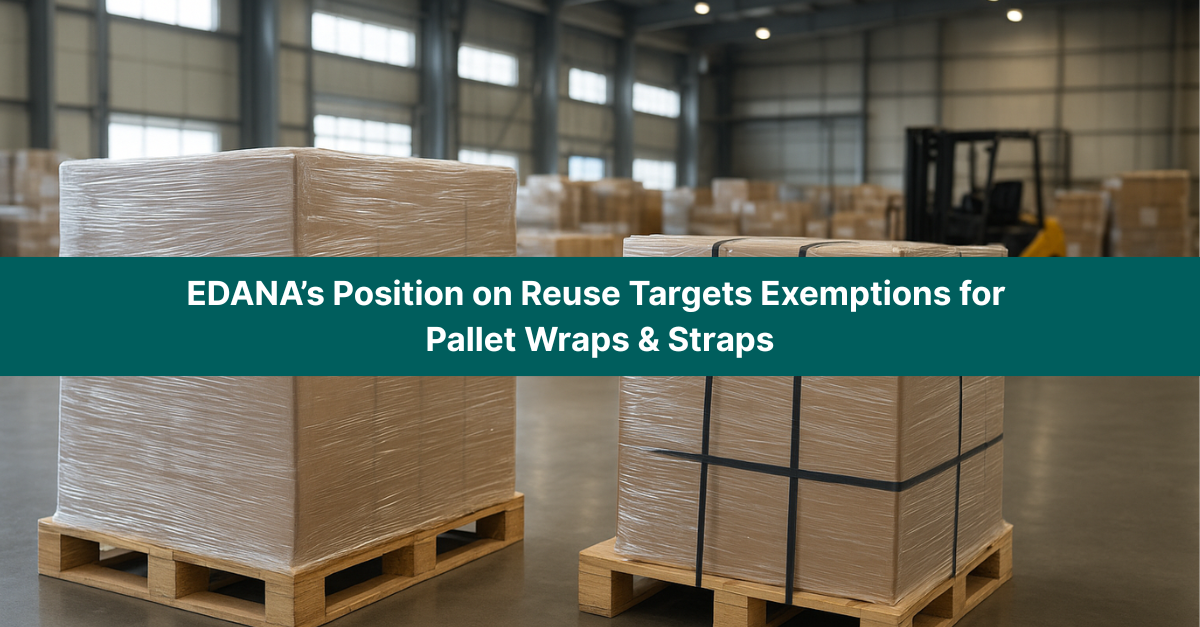EDANA's Position on Reuse Targets Exemptions

EDANA, the leading global association for the nonwovens and related industries, represents over 270+ member companies across the entire supply chain, including producers of a wide range of packaged goods and, in some cases, contributors to the manufacturing of packaging materials themselves. Brussels, 12th of August 2025 - EDANA, the leading global association for the nonwovens and related industries, represents over 270+ member companies across the entire supply chain, including producers of a wide range of packaged goods and, in some cases, contributors to the manufacturing of packaging materials themselves.
Brussels, 12th of August 2025 - EDANA, the leading global association for the nonwovens and related industries, represents over 270+ member companies across the entire supply chain, including producers of a wide range of packaged goods and, in some cases, contributors to the manufacturing of packaging materials themselves.
As the European Commission is currently preparing a delegated act, which will define the exemptions to the reuse obligations for certain transport packaging formats and economic operators, EDANA is particularly concerned about the inclusion of plastic pallet wraps and straps within the scope of mandatory reuse targets.
Their exclusion from reuse obligations is justified not only by their technical characteristics, but also by the disproportionate operational, financial, and spatial burdens that reuse systems would impose. Moreover, forced substitution without adequate lifecycle analysis may ultimately undermine packaging minimisation efforts and result in a higher environmental impact.
Given the clear logistical, economic, and environmental challenges outlined hereafter, EDANA urges the European Commission to exempt plastic pallet wrapping films and straps used in B2B logistics from the reuse targets.
IMPORTANCE OF TAILORED AND FLEXIBLE TRANSPORT PACKAGING SOLUTIONS
The nature of customer ordering patterns and manufacturing logistics requires highly flexible and adaptive transport packaging solutions. Single-use plastic wraps and straps are essential to accommodate a broad range of load sizes, shapes, and configurations, from single parcel shipments to mixed or full pallet loads. Reusable transport packaging, by contrast, presupposes a level of standardisation that is incompatible with the diversity and complexity of supply chains, particularly for industries that rely on packaging minimisation and tailored fit to reduce environmental impact.
PACKAGING MINIMISATION AND LIGHTWEIGHTING STRATEGIES
Single use wraps and straps are not only flexible but also critical to ongoing packaging minimisation strategies. Because they conform to the exact shape and dimensions of the load, they avoid over-packaging and optimise material use. Imposing reuse obligations on such formats would undermine innovation aimed at reducing the overall volume and weight of packaging, contrary to one of the core objectives of the PPWR.
DISPROPORTIONATE ECONOMIC AND OPERATIONAL IMPACTS ON INDUSTRY
The transition to reusable wrapping and strapping solutions would entail significant operational changes and capital expenditures. For many companies, this would involve the write-off of existing equipment and investment in new systems. According to RDC Environment[1], which conducted an assessment on 8 different sectors, the total estimated annual cost of transitioning from current single-use solutions to reusable alternatives is projected to exceed €4.9 billion across just eight sectors alone. Furthermore, reusable systems are more labour-intensive and require additional handling, maintenance, and training, adding to the economic burden on operators.
LOGISTICAL AND SPATIAL CONSTRAINTS
Reusable packaging formats occupy substantially more space than single use wraps and straps. This applies not only during reverse logistics (return transport) but also in storage and production areas, which are often tightly constrained. Many facilities lack the space to accommodate the extra volume associated with reusable transport packaging formats, making compliance impractical without costly restructuring.
RE-QUALIFICATION AND SAFETY CONSIDERATIONS
Any change in pallet configuration, particularly involving the securing system, requires re-qualification to ensure safety and performance during transport. This is especially relevant for industries handling sensitive or high-value goods. Requiring such validation across the entire logistics chain for each variant of reusable wraps and straps would generate significant administrative and financial burdens.
THE NEED FOR AN EVIDENCE-BASED ASSESSMENT: LCA AND ENVIRONMENTAL TRADE-OFFS
Before mandating the reuse of certain packaging formats, it is essential to conduct a thorough Life Cycle Assessment to compare environmental impacts. Factors such as increased material weight, cleaning, repair, reverse logistics, and end-of-life treatment must be considered. The comparative life cycle assessment conducted by the Institute for Energy and Environmental Research (IFEU)[2] suggest that single-use plastic wraps and straps, due to their lightweight nature and recycling potential, may offer lower overall environmental impacts than reusable alternatives in many use cases. The study indeed indicates that, across all application areas assessed, single-use plastic pallet wrappings outperform reusable transport packaging in every environmental impact category, provided they contain at least 35% post-consumer recycled content, as will be required from 2030 under Article 29 of the PPWR.
For further information, please contact:
Brieuc LITS, Public Affairs Director, EDANA
Alexander HEUSCH, Regulatory Affairs Manager, EDANA